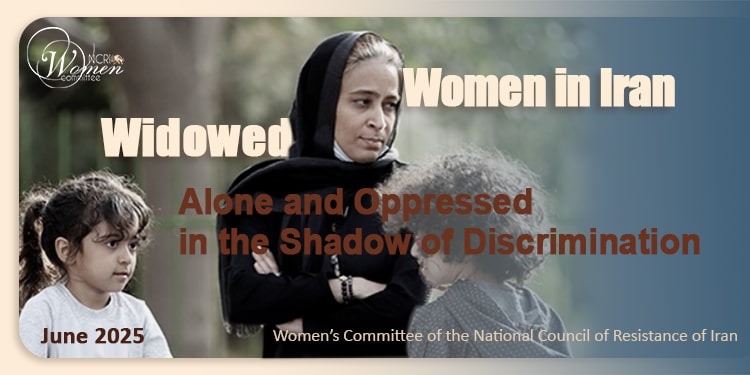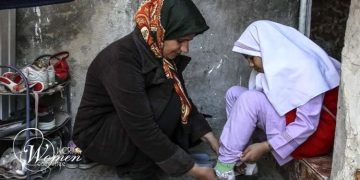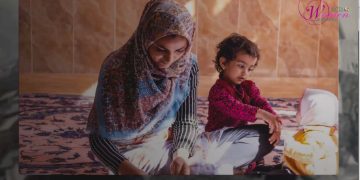Widowed Women in Iran, Alone and Oppressed in the Shadow of Discrimination
In the Iranian legal system, where gender-based discrimination is deeply entrenched, women are not recognized as heads of household. As a result, when a woman becomes a widow, she is not only burdened with the emotional weight of her loss, but is also thrust into a web of economic, social, and legal challenges. In this context, widowhood becomes more than a personal tragedy—it is treated as a social stigma.
Widowed women are often marginalized and excluded from full participation in society. They face a host of legal obstacles, particularly in areas such as inheritance, child custody, property ownership, and access to insurance. The legal framework is overwhelmingly designed in favor of men, leaving widows vulnerable to systemic injustice and discrimination.
The Iranian regime does not even recognize International Widows’ Day on its calendar.
Contradictory Statistics and Lack of Transparency
According to the state-run Jahan-e Sanat newspaper, September 21, 2020, there are approximately 5.1 million widowed or divorced women in Iran. Previously, Shargh newspaper (July 4, 2011) had reported this number as 6 million.
According to the National Statistical Center of Iran and the 2006 national census, the number was 1.89 million—six times the number of widowed men.
In 2017, 15,000 widowed girls under the age of 15 were reported.

Female Heads of Households
According to the Donya-e-Eqtesad economic news site (May 3, 2025), the number of female heads of households has surpassed 6 million, with half lacking any form of insurance. In addition to running their households, these women are deprived of basic social support and are exposed to hidden forms of violence and dependency.
Social and Cultural Condition
Under the ruling system, women are not officially recognized as heads of households, and widowhood is considered a “social disaster.” Widowed women are often marginalized and excluded from social participation.
According to Etemad newspaper (June 23, 2018), over 90% of widows do not remarry—this is largely due to social, cultural, and familial pressures rather than personal choice. This is especially true given that, under Iranian law, women lose custody of their children upon remarriage.
The Main Problems and Challenges Faced by Widowed Women in Iran
Widowed Women in Iran, in a society shaped by patriarchal laws and a misogynistic regime, face compounded hardships following divorce or the death of a spouse. On one hand, they must deal with the trauma of separation and prepare themselves for a new life situation. On the other, they must endure legal, economic, and cultural pressures imposed by the ruling misogynist system.

Economic and Social Problems of Widowed and Divorced Women
Poverty, Unemployment, and Lack of Support
Widowed women in Iran are often responsible for providing for their families, but insufficient financial support from the government has led to a crisis in their lives. According to Negar Akbari-Zargar, a member of the Iranian Psychological Association, these women are often exploited in the workplace, hired at wages below standard, and due to a lack of awareness about their rights, accept any job under any condition. They work in poor conditions, suffer abuse, and remain silent out of fear of unemployment. (Asr-e Iran – June 22, 2020)
Post-Divorce Hardships According to a Social Worker
Anvar Samadi-Rad, a sociologist, lists the main post-divorce issues for women in this order:
71% of divorced and widowed women with children are single parents. Only 16% are employed, and most rely on the help of others to meet basic living needs. (Qods– March 3, 2013)
Widowed and divorced women in Iran even face housing challenges. 39% of them struggle to find housing or are unable to stay in hotels or guesthouses. Patriarchal attitudes and economic difficulties are the main obstacles preventing them from renting or purchasing a home. (Qods– March 3, 2013)
The Clerical Regime Is Directly Responsible for Widowing Women
Just like in every other area of destruction, the corrupt clerical regime provides no statistics on widows—but it is no secret that it is the primary cause of the growing number of widowed women and the descent of Iranian women into deep poverty and suffering.
A large number of Iranian women are forced into widowhood as a result of misogynistic laws entrenched in the country’s legal system. Under Article 1041 of the Islamic Republic’s Civil Code, a girl’s father, grandfather, or even a judge has the authority to permit her marriage as early as age 13—or even younger. Often, these girls are married to men old enough to be their fathers.
According to Shahr Khabar news agency, on October 16, 2024, more than 19,000 women and girls had been married to men at least 15 years older than themselves in the previous year alone. This occurs within a legal and economic framework overwhelmingly structured to benefit men, leaving women without meaningful protections or autonomy.
Moreover, the laws of the clerical regime in Iran do not prohibit polygamy. The regime’s so-called “Family Protection Law” merely sets conditions for taking additional wives—conditions that are easily circumvented. Temporary marriage (sigheh) is also legal and explicitly institutionalized under Article 1152 of the Civil Code, which defines its duration. Furthermore, men have the unrestricted right to divorce their wives at any time, without cause or mutual consent.
These discriminatory laws have led to a rise in the number of divorced women, many of whom face social and legal hardships similar to those of widows. The overall result is the weakening of the family structure and an increase in the number of women who are left without support.
In addition to these systemic legal injustices, many women become widows due to the regime’s own acts of violence and the disasters caused by its policies and negligence.
Amid Grief, Crushing Poverty
Among the bereaved families, poverty is so deep and pervasive that merely describing it sends a chill down one’s spine. One such family is from Zahedan, a city in southeastern Iran, where they live in a structure that more closely resembles a shack than a house. The family consists of an elderly mother, a young widow, and a sister with a disability who, despite being thirty years old, is so frail that she appears to be a child. Their home is crumbling, and poverty seeps from its very walls. Hayatollah was the family’s sole breadwinner—now he is gone.
Most of these families are illiterate. What emerges is a staggering scale of suffering, poverty, vulnerability, alienation, and powerlessness in the face of injustice. There are no answers to the pressing questions: Why were so many undocumented, unregulated workers employed at one of Iran’s most critical ports? Why were industrial safety standards so weak and unenforced? Why did crisis-response infrastructure fail so catastrophically?
And now, who will be held accountable for this human tragedy? (Rokna– May 11, 2025)
























